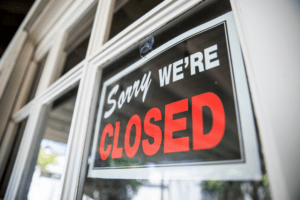
Hurricane Ian hit Florida and several other areas of the state incredibly hard, leaving many businesses unable to serve customers. With yet another hurricane bearing down on the Sunshine State, more companies are bound to be affected.
This overview of business interruption insurance will help if you’re business has been forced to close due to extreme circumstances. For other businesses, this will serve as a guide for how to ensure your companies are protected in the event of a disaster.
If you’re experiencing a business interruption, you need to be aware of business interruption insurance and how it can save you from financial losses and the additional stresses of trying to resume business in the middle of rebuilding after a natural disaster. As quickly as possible, begin taking stock of any losses you have suffered and record them as you start preparing a claim to your insurance company. However, insurance companies are interested in saving money and paying as little as possible.
What if your claim is denied? Read on to learn more about business interruption insurance, how it works, and how a lawyer can help you ensure that your claims are honored.
What Will Trigger a Business Interruption Policy?
Generally, a business interruption insurance policy will be triggered by any natural disaster that could leave you out of business for several days. This could include storms, natural disasters, a fire, or hurricanes. Different policies will have other descriptions. This language is often deliberately cryptic to discourage policyholders from filing a claim. There may also be exclusions written into the policy that may give the insurance company an excuse for denying the policy. It often takes an expert to truly understand the coverage of a business interruption policy and how it applies to a specific case.
How A Lawyer Can Help You
A lawyer can help you read through the various components of your specific policy to determine whether you have a claim. They can also represent you in your dealings with the insurance company, defending your rights and saving you the trouble of dealing with the insurance companies. Furthermore, merely the presence of a qualified attorney can often discourage any kind of manipulation or double-dealing, thus increasing the likelihood of your claim being successful.
What Should I do if an Insurance Company Denies My Business Interruption Claim?
If your business is a victim of a recent hurricane, or any other disaster in Florida, immediately reach out to us at the Winston Law Firm. Our attorneys have years of experience and a high success rate when working to ensure that insurance claims are honored. We will work with you to file your claim and ensure that you receive the compensation you deserve.
If you have any further questions about business interruption insurance, we have provided a Frequently Asked Questions (FAQ) section below.
Frequently Asked Questions
- Q. Do I need a specific business interruption policy to get coverage?
Business interruption insurance is not sold as a separate policy but is an add-on to an existing policy. You will need the specific add-on in order to make a business interruption claim. However, other policies may have similar kinds of coverage which you might be able to use.
- Q. How do I know I have business interruption insurance?
Look at your policy, or contact your insurance company to find out exactly what kind of insurance you are carrying.
- Q. What losses from hurricane Ian may be covered under a business interruption policy or clause
Generally, this insurance policy covers losses in business income (i.e., lower sales, taxes, or employee wages). However, business interruption insurance does not cover broken items, flood or earthquake damage, or pandemics.
- Q. What is a bad faith claim
A bad faith claim is a lawsuit conducted to hold an insurer to their legal obligations as dictated by the terms of their policy. In this lawsuit, the policyholder sues the insurance company for acting in “bad faith” for denying their claim or in some way witholding money owed to the insured.
- Q. What damages may I recover in a bad faith claim?
Three types of damages can be recovered: contract, extracontractual, and punitive damages. Contract damages award the insured the money that was denied, plus interest. Extracontractual damages may compensate you for economic losses, emotional distress, or attorney fees. Finally, the highest amount of damages can be recovered as punitive damages, which are designed to punish insurance companies.To get a better idea of the possible damage amounts, take a look at our list of notable results.


